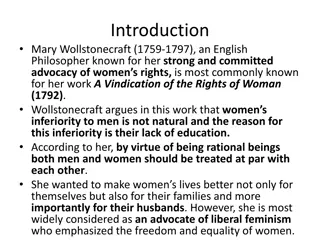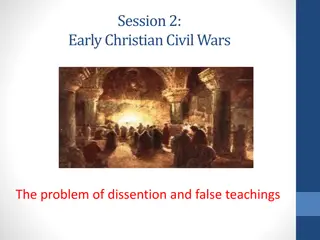
Early Middle Ages Gothic Kingship
Explore the history of Gothic kingship in the Early Middle Ages, featuring Kings of the Ostrogoths in Italy and the intriguing dynamics of power and downfall. Dive into stories of love, betrayal, and political intrigue that shaped this fascinating era.
Download Presentation

Please find below an Image/Link to download the presentation.
The content on the website is provided AS IS for your information and personal use only. It may not be sold, licensed, or shared on other websites without obtaining consent from the author. If you encounter any issues during the download, it is possible that the publisher has removed the file from their server.
You are allowed to download the files provided on this website for personal or commercial use, subject to the condition that they are used lawfully. All files are the property of their respective owners.
The content on the website is provided AS IS for your information and personal use only. It may not be sold, licensed, or shared on other websites without obtaining consent from the author.
E N D
Presentation Transcript
History of the Early Middle Ages a.y. 2023-2024 prof. Maria Cristina La Rocca mariacristina.larocca@unipd.it
Kings in Ostrogothic Italy Kings of the Ostrogoths ? 468 Valamir, in Pannonia 468 474 Theudimir, brother of Valamir; in Macedonia 473 474 526 Theoderic, son of Theudimir; associated 471; in Italy 489 526 534 Athalaric, son of Eutharic by Amalasuntha, daughter of Theoderic 526 535 Amalasuntha, daughter of Theoderic; regent for Athalaric 534-535 Amalasuntha and Theodahad her consors regni 534 536 Theodahad, nephew of Theoderic 536 540 Vittigis, husband of Matasuntha, sister of Athalaric 540 541 Hildebad, nephew of Theudis 541 Erarius, son of Frideric, king of the Rugians 541 552 Totila (Baduila), nephew of Hildebad 552 Theia 552 554 Aligern, brother of Theia, regent
Love and the Fall of the Gothic Kingship Theodahad (534-536) (GW, 5, 11.5-12 [5] After gathering at Regata, the Goths chose as king over them and the Italians Vittigis, a man who was not of an illustrious house but had previously won great renown in the battles by Sirmium, when Theoderic was waging the war against the Gepids. [6] Theodahad, therefore, upon hearing this, rushed off in flight and headed for Ravenna. But Vittigis quickly sent Optaris, a Goth, instructing him to bring Theodahad alive or dead. [7] Now it happened that this Optaris was hostile to Theodahad for the following reason. Optaris was wooing a certain young woman who was an heiress and extremely beautiful to look upon. [8] But Theodahad, moved by a bribe, took the woman he was wooing from him and betrothed her to another man. And so, not only satisfying his own rage but rendering a service to Vittigis as well, he pursued Theodahad with great eagerness and enthusiasm, stopping neither day nor night. [9] He overtook him while still on his way, laid him on his back on the ground, and slew him like a victim for sacrifice. Such was the end of Theodahad s life and rule, which had reached the third year. The cumbersome presence of women is the backdrop that explains some of the twists and turns of the successive kings of the Goths and the political instability during their rule.
Uraia and Hildebad (540) (GW, VII, 1, 37-41). [37] But later it happened that enmity sprang up between Ura a and Hildebad for the following reason. Ura a had a wife who was deemed first among all the women of these barbarians in wealth and physical beauty. [38] She once went down to the bath clad in magnificent ornaments and followed by a large retinue. [39] Seeing the wife of Hildebad there in plain garments, she not only did her no obeisance as the consort of the king but ignored and insulted her. For Hildebad was still in poverty, having by no means come into royal wealth. [40] The wife of Hildebad, being much offended by the uncalled-for insult, came to her husband in tears and demanded that he avenge her for the outrageous treatment she had received at the hands of Ura a s wife. [41] Accordingly Hildebad first slandered Ura a to the barbarians, saying that he intended to desert to the enemy, but a little later he put him to death by treachery and thereby incurred the hatred of the Goths. [42] For they by no means wanted Ura a to be so casually removed from the world. A large number of them formed a party and began to denounce Hildebad vehemently as having committed an unholy deed. But no one was willing to punish him for this murder.
Hildebad (540-541) (GW, 3, 2, 43-49). [43] There was one among them, Vela by name, who, although a Gepid by birth, had risen to become a spearman of the king. [44] This man had wooed a beautiful woman and loved her with an extraordinary passion; but while he was on an expedition against the enemy, to make an attack upon them in the company of certain others, Hildebad married his fianc e off to someone else among the barbarians, either through ignorance or through some other motive. [45] When Vela returned from the army and heard this, being passionate by nature, he could not bear the insult that had been done to him and decided to kill Hildebad immediately, thinking that he would thereby please all the Goths. [46] And so, when the king was once entertaining the noblest of the Goths at a banquet, he watched for his chance and put his plot into execution. [47] For while the king is dining, it is customary for many persons to stand about him and among them his bodyguards. So when he had stretched out his hand to the food as he lay reclining upon the couch, Vela suddenly struck his neck with his sword. [48] While the food was still grasped in the man s fingers, his head was severed and fell upon the table and astonished all those present, who were stunned. [49] Such, then, was the vengeance that overtook Hildebad for the murder of Ura a.
Gaca, K.L. 2010, The andrapodizing of war captives in Greek historical memory , TAPA 140, 117-61. One of the most relevant aspects of the Greek narratives on warfare concerns the practices carried out in enemy cities by the victors after sieges: the destruction of the defeated community is accomplished by distinguishing the fate of men, who are killed, and women and children, who are first selected and then taken away to be dispersed and sold elsewhere as slaves. One verb in particular, antrapodizo, is used to succinctly signify the use of this military 'technique' not only to represent victory, but to explain that the future fate of women and children captured in this way would forever mark their condition, even for generations to come, condemning them to a destiny of inequality and 'social death'.
Gaca has shown how the use of the verb is a constant in Greek war narratives, starting from Thucydides, and certainly in using this expression Procopius wanted to be part of this prestigious tradition. However, it is important to dwell on this element, which underlines, also from a gender perspective, the role of the unarmed (women and children) in sanctioning and marking the victories of the imperial army. This aspect is underlined several times in the case of Naples , for the campaigns by the Huns in Illyricum and is presented as a very likely prospect for Sicily invaded by the Goths ; in Milan the Goths razed the city to the ground and sent the women as slaves to the Burgundians, to reward them for their loyalty.
General Belisarioss speech to Stephanus (GW, I, 9, 22-28) Naples, 536 [22] When everything was perfectly ready, the thought occurred to Belisarios that if the army made its entry into Naples by an act of war, the result would be that lives would be lost and all other things would happen that usually follow the capture of a city by an enemy. [23] Summoning Stephanus, he spoke as follows: I have witnessed the capture of cities many times and am well acquainted with what takes place at such a time. [24] They slay all the men of every age and, as for the women, although they beg to die, they are not given the gift of death but are carried off for outrage and suffer treatment that is abominable and most pitiable. [25] The children are deprived of their proper maintenance and education, and are forced to be slaves, and slaves of the men who are the most hateful of all those on whose hands they see the blood of their fathers.
[26] I set aside here, my dear Stephanus, the flames that destroy properties and blots out the beauty of the city. When I see Naples falling victim to such a fate, as in the mirror of the cities that have been captured in times past, I am moved to pity it and you its inhabitants. [27] I have ready now against it such devices as will make its capture inevitable. But I pray that an ancient city, which for ages has been inhabited by Christian Romans, may not meet with such a fortune, especially at my hands as commander of Roman soldiers, not least because in my army are a multitude of barbarians who have lost brothers or relatives before the wall of this town. I will be unable to control the fury of these men if they capture the city by act of war. [28] While, therefore, it is still within your power to choose and act to your advantage, adopt the better course and avoid misfortune. For when it falls upon you, as it probably will, you will not justly blame fortune but your own judgment .
[29] Then a great slaughter took place, for all of them were furious, especially those who had chanced to have a brother or other relative slain in the fighting at the wall. They kept killing all whom they met, regardless of age, and dashing into the houses they made slaves of the women and children and secured the valuables as plunder. In this the Massagetai outdid the rest, for they did not even hold back from the sanctuaries, killing many who had taken refuge in them, until Belisarios, going around to every part of the city, put a stop to it.
Bologna, the Huns, the Illyrians (544) (GW, III, 11, 12- 16) So Vitalios with this force came up to the city of Bologna and, after taking some of the neighboring fortresses by surrender, remained inactive in Bologna. [13] But not long after this all the Illyrians who were serving under him, suddenly and without having suffered any hard treatment or heard any rebuke, withdrew secretly from the town by night and went home. [14] Sending envoys to the emperor, they begged him to grant them a pardon, seeing that they had come to their homes in this manner for no other reason than that, after long service in Italy without receiving the regular pay at all, the state now owed them a large sum of money. [15] But it happened that a Hunnic army had fallen upon Illyria and enslaved their women and children, [16] and it was when they learned this, and also because they had a scarcity of provisions in Italy, that they withdrew.
Dalmatia and Liguria (GW, VII, 40, 27), a. 550 [27] For he (Spinus) declared that he had recently heard, while he was among the enemy, that Germanos, the emperor s nephew, had passed from the world and that Iohannes, his son-in-law, and Ioustinianos, his son, with the whole army collected by Germanos were already in Dalmatia and would move on from there, after completing their preparations in the briefest time, straight for Liguria, in order, obviously, to descend suddenly upon the Goths and make slaves of their women and children and to plunder all their valuables; and it would be better, he said, if we were there to meet them, passing the winter in safety with our families.
Milan (Gothic war, VI, 21, 39) [39] The barbarians (the Goths) did them no harm, simply putting them under guard with Mundila, but the city (Milan) they razed to the ground, killing all the males of every age to the number of not fewer than three hundred thousand and reducing the women to slavery and then presenting them to the Burgundians to repay them for their alliance. [40] When they found Reparatus, the praetorian prefect, they cut his body into small pieces and threw his flesh to the dogs.
Pavia (Gothic war, VI, 25, 8-9) [8] When they [the Franks] reached the city of Pavia, where the ancient Romans had constructed a bridge over this river, those who were on guard there gave them every assistance and allowed them to cross the Po unmolested. [9] But, upon getting control of the bridge, the Franks began to sacrifice the women and children of the Goths whom they found there and to throw their bodies into the river as the first fruits of the war. [10] For these barbarians, although they have become Christians, practice most of their ancient religion, for they still make human sacrifices and other unholy offerings, and thereby they obtain oracles.
The Slavs and their civilisation (Gothic war, VII, 38, 17-20, 23) [17] But the barbarians [ the Slavs] overwhelmed them by the multitude of their missiles and forced them to abandon the battlements, whereupon they placed ladders against the fortifications and so captured the city by storm. [18] They slew all the men immediately, to the number of fifteen thousand, took all the valuables as plunder, and enslaved the children and women. [19] Before this, however, they had spared no age, but both they and the other group, since the time when they fell upon the land of the Romans, had been killing all who fell in their way, regardless of age, so that the whole land of Illyria and Thrace came to be everywhere filled with unburied corpses. [20] They killed their victims not with sword or spear, nor in any other familiar way, but by planting stakes very firmly in the earth, having made them extremely sharp, and, by impaling the poor wretches upon them with great force, drove the point of the stake between the buttocks and pushed it up into the intestines. That was how they preferred to kill them. [ ] [23] But from this time onward both groups, being as it were drunk with the great quantity of blood they had shed, decided to make prisoners of some who fell into their hands, and consequently they were taking with them countless thousands of prisoners when they all departed to go home.
It has been noted that from the earliest Greek historiography "unarmed combatants, women and children become pawns not only in the practice of war, but also in the rhetoric of war". While this is undoubtedly true, one cannot generalise this instance to the point of considering all narratives of war from antiquity as the simple and equal repetition of standardised motifs. Indeed, Procopius' attention rarely dwells on women who are not senators' wives and that groups of ascetics and nuns, present in other sources as victims par excellence of war, do not interest him at all. Similarly, unlike the authors of hagiographies of his contemporaries, he does not linger to describe in detail scenes of violence against women or groups of defenceless people.
Female weakness? Rather the treatment of women and children during a war appears to be an aspect through which the political stature and leadership character of men can be measured. Is this a way of expressing, through gender categories, the need for male protection over inherent female weakness?
Totila (Gothic war, 3, 25-21) (y. 546) Totila received this supplication with favor and forbade the Goths thereafter to kill any Roman, but he permitted them, while setting aside for him the most valuable of the property, to plunder all the rest for themselves at will. [26] He found much in the houses of patricians, but most of all in the house where Bessas had lodged. For that ill-starred despicable man had effectively been collecting for Totila the outrageous sums that, as explained above, he had charged for the grain. [27] Thus the Romans in general, and particularly the members of the senate, found themselves so reduced that they wore the clothes of slaves and peasants and lived by for begging bread or other food from their enemies; a notable example of this was Rusticiana, the daughter of Symmachus and wife of Boethius, who was always lavishing her wealth on the needy.
[28] They went around to all the houses and kept knocking at the doors and begging to be given food, feeling no shame in doing so. [29] Now the Goths were eager to execute Rusticiana, bringing against her the charge that, after bribing the commanders of the Roman army, she had destroyed the statues of Theoderic in order to avenge the murder of her father Symmachus and husband Boethius. [30] But Totila would not permit her to suffer any harm; he guarded both her and all the other women from insult, although the Goths were eager to take them to bed. [31] Consequently not one of them suffered any bodily insult, whether married, unwed, or widow, and Totila won great renown for moderation from this policy.
Participation of women in the war? Many attempts have been made to grasp what women's participation in the war was, apart from that of waiting passively - locked in their own city - for events to take place. Procopius certainly does not suggest that women's participation, especially in the siege of a city, was anything other than this: waiting to be taken away, together with their children, by the victorious enemies. A meticulous search within the Wars revealed only two examples of female 'resilience' during a siege, both of which can be traced back to a Middle Eastern context: during the siege of Edessa, women and children took an active part in the city's resistance (preparing provisions, throwing the occasional bullet from the battlements), in Amida a group of prostitutes mocked the defeated Persians by displaying their nudity. if prostitutes were to be considered as entertainers for the soldiers and therefore also active participants in the 'climate' of war, then we could also consider the women with whom the imperial army was partying in the occupied cities in 543 .
According to Procopius women have a more than vicarious role in warfare, as he amply demonstrates in dealing with the thorny problem of the Amazons. If the Amazons represented "the continuing struggle within Greek society both against the monstrous disorder that a society of warrior women represented and against the equally monstrous solution of female annihilation (P. Geary), Walter Pohl has pointed out that Procopius' specific intention was to neutralise the idea that an entire people of warrior women had ever existed, minimising its actual impact and linking the existence of a group of armed women to the strict contingency. Since their husbands had all been killed and they were surrounded by hostile populations, they had armed themselves out of fear, necessity and even against their will. In time they had all been exterminated.






















